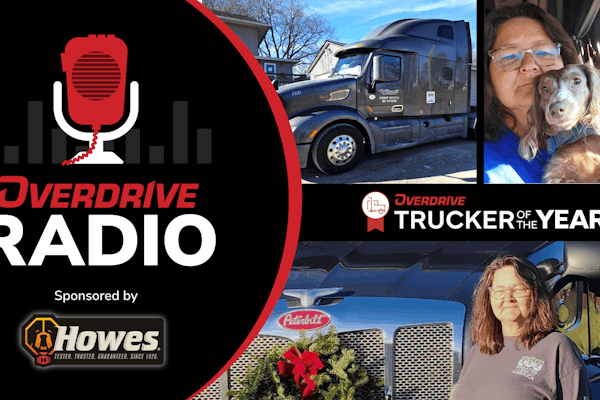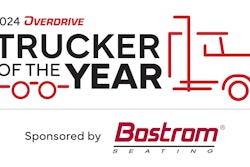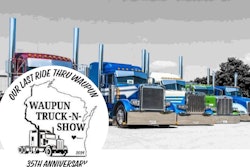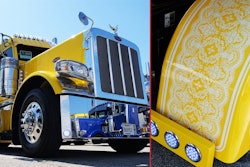About the Author
Raised in the Old West, Barbara White traveled the world before meeting her husband Bill, then explored the United States from the passenger seat of his truck. A 1992 Mark Twain Essay Contest honorable mention winner, Barb entered this year’s contest in competition with her husband Bill, who drives a 2001 Freightliner for TSI Kansas, out of Clay Center, Kan. Barb teaches near the Rosebud Sioux Indian Reservation and makes her home in Herrick, S.D., with their two children, Samantha and Will, and her husband Bill (watch for his honorable mention story later this year).
Jimmy was tired. It was dusk on a Saturday, and he had been driving this same two-lane highway since lunch. He was tired of squinting, tired of watching for deer on the road and tired of sipping on cool, stale coffee. Most of all, he was tired of worrying. The radio in his truck was terrible. For the past hour it had only picked up the local religious station. He had listened to radio dramas of David and Goliath and Joseph’s Coat of Many Colors. When the story of The Good Samaritan finished, the singing began. Jimmy turned off the radio. The little town of Mud Butte was 10 miles ahead, and he decided to make a pit stop there.
His headlights picked out another dead deer along the shoulder of the road. This year was crazy for deer. Twenty miles back he’d had to stop to let a whole herd cross the road. And tame! They hadn’t even spooked when he fired his air horn at them. The lump at the side of the road was past before Jimmy realized what he had seen. His foot made sense of it first and came off the accelerator. Jimmy dropped a gear. He wasn’t sure what, but something was wrong.
He argued with his conscience for the next mile. It was just a deer, and the flash of color was a Game, Fish and Parks road-kill tag. Jimmy looked in his mirrors and saw nothing. The sun had gone down, and there were no headlights ahead or behind. Why should he go back? It wasn’t his job to check out every lump along the road. He was in the middle of the freaking South Dakota prairie. Of course it was a deer. Or a cow. What else would it be? He was just tired and needed a break.
And he was a day behind where his dispatcher wanted him, but weather and logbook rules had conspired, and there was nothing he could do about it. Tonight he needed to make some miles, not jump at every ghost his brain invented.
But Jimmy was a million-mile driver. He had seen his share of death shoved onto the shoulder of the road, and something about this niggled. The highway widened for a historic landmark pullout. “Aw, what the heck.” He turned his rig around.
He drove slowly on his way back. The roadside was empty. Time and distance could play ticks, so he drove another mile but still saw nothing. Jimmy shook his head sheepishly. “Jimmy, old boy,” he said to the eyes in the mirror, “you are a sorry son of a gun!” He kicked himself for playing heroics. Now here he was on a two-lane highway headed the wrong direction. At the next section line road he was going to have to pull in and back out across traffic. It was against safety rules, but his mirrors stayed black and he hoped this stretch of South Dakota would live up to its reputation and stay empty a few mintues more.
Back on track, Jimmy let his eyes scan the ditch. He had already lost a good 10 minutes, but he planned to make that up by driving right past the next town. His break could wait. Jimmy thought of his dispatcher who was angry, his son who was sick and his wife who had taken off work to be at the hospital, and he wondered what on earth had made him turn around. “At the historic marker, this is over,” he decided. But he had to see that deer again to satisfy his curiosity, and maybe to convince himself he wasn’t losing his marbles.
Suddenly the lump appeared on the side of the road. He wasn’t crazy after all. He slowed to a crawl. “Oh, my holy Lord!” Jimmy pulled his air brakes and flipped his flashers. He hit the pavement in one jump and ran around the front of the truck. “Hey, are you OK?”
The man in the ditch was definitely not OK. His shirt was torn and bloodstained, and he moaned through swollen lips. Jimmy knelt by him only long enough to reassure the man. “I’m going to call for help,” he said. “I’m coming right back.” He raced for his cell phone. Please have service, please have service. There was one bar on the phone’s LCD window. Please have 911. He dialed. “Go through,” he muttered. Mud Butte was as rural as you could get.
The phone clicked and finally connected. “Sheriff’s office, what is your emergency?”
“There’s a man, he’s beat up bad.” He gave their location and was advised to “please stay on the line until emergency personnel have arrived.”
Phone to his ear, Jimmy sat next to the tangle of a man. “They’re on their way,” he said. “You’re going to be OK.” It was hard to tell how badly he was hurt. Bad enough, Jimmy decided.
“You’re OK now,” Jimmy repeated, and then, because he couldn’t think of anything else to fill the silence, he told the man about his son and his wife who sat by the hospital bed each day and kept the family from falling apart. He told him about tomorrow’s surgery and how he could never drive enough to pay for it. Jimmy didn’t know if the man could even hear him, but he filled the night with soft tones. The man was only partly conscious, and his ear had cauliflowered against the bloody scalp. His cheekbone was caved in, and one arm looked broken. His clothes were ragged and seemed dirty under the blood. Jimmy wondered if he really would be OK.
“I think I hear the ambulance,” he said into the phone. He looked at his watch and listened to the siren approach.
It was all flashing lights and noise. Highway Patrolman Clark was polite and professional. He took Jimmy’s name, and the EMTs took the man away on a stretcher. As fast as it had begun, it was over. The sirens dimmed in the distance.
“Follow me into town,” Officer Clark said. “You can wash up at the Muddy Mart.” He flashed a brief tight smile. “And I’ll buy you a cup of coffee.”
Jimmy looked down and saw blood on his hands and shirt. He must look as shaken as he felt.
A day later, Jimmy was still shaken as he stood in his dispatcher’s office explaining his logbook. “I never did find out who the guy was.” He flexed and unflexed his hands. “Nobody on the ambulance knew him, and the lady at the mini mart couldn’t think who it could be. Of course I couldn’t give you a very good description, he was all banged up.” Jimmy paused. “What could you do to make somebody that mad?” he wondered for the thousandth time. The man’s bloody face had haunted his sleep. “I figure he was just some bum in the wrong place at the wrong time. Or maybe it was drugs. Or gangs.” Jimmy stopped himself. “I guess I’ll never know,” he said softly, then shook his head. He turned to business. “So my log shows two hours off duty there at Mud Butte. I missed the delivery time in Sioux Falls, and I’m out of hours now. I need a day to catch up with myself, then you can send me back out.” Jimmy left his paperwork and headed for the hospital. At least he could see his son in the recovery room.
Jimmy’s wife picked up the mail every day on her way to the hospital. Their son was getting better, but their finances were not. She dialed Jimmy’s number, and they faced their declining bank account together. “Today we got the gas bill, a credit card bill and another letter from the hospital. I told them to send that to the insurance company.” Her voice was tight with stress. “I’ll look at it later.”
“I wish I could help you with that.” Here he sat looking at Georgia asphalt, and she had to deal with all of this. He glanced up in the mirror and saw the familiar, helpless deer-in-the-headlights look on his face.
“Don’t worry, Jimmy. You’re getting us through this. I’ll talk to their office again. We’ll be all right somehow.” There was another pause and a shuffle of paper. “Here’s something. It’s a real letter. Do you know a Jenson from South Dakota?”
“Open it.” His hand shook on the steering wheel. “What does it say?”
“Dear James Butler,”she began. “Well, I guess he knows you. Just a minute, something fell out. It’s newspaper clippings – about you and that guy you saved.” She began to read again:
“Dear James Butler,
My name is David Jenson and I would like to thank you for my life. Last month you rescued me from the side of the road near Mud Butte, S.D. My doctor assures me that if I had stayed out there even an hour longer, I would now be dead. I’m doing fine, but they tell me I will remain their guest a while longer.
The irony of my situation is that I got into this mess by stopping to help someone, and I was saved by someone who was willing to stop and help me. You have saved my faith in humanity as well as my life.
You must have wondered who I am and how I came to be where you found me. I work for a securities firm on Wall Street, but confess to having loved the Old West since childhood. My wife and sons humored me this year, and we spent two weeks together in the Black Hills. I sent them home on United and called in sick to work (another irony, considering my current lodgings). I stayed a few days by myself, camping along Rapid Creek.
Normally, I wouldn’t have stopped, but they were just kids, broken down on the side of the road, and I figured it was South Dakota, what could go wrong? They had a baseball bat in the car, and as you noticed, they used it. We drove 30 miles before they rolled me out near Mud Butte. I found out later they were transporting drugs. Their car was recovered where they left it, and mine was found along I-90 the next day. The boys themselves were caught in a borrowed Honda somewhere in Minnesota.
I don’t remember much of that night. You probably know more of the details than I. What I do remember, besides the pain and the dark, was your voice. I can still hear your kind reassurances that I could be OK and your story about a son you were afraid would not be.
I spent a week wondering how I could possibly thank you, but once I hit upon my idea, you’d be surprised how easy it was to find the information I needed. Plus, I pulled a few strings, for which I hope you will forgive me. I was afraid you would not accept a check, so instead I have paid your hospital bill. I hope your boy is doing well. If you are ever in my neck of the woods, give me a call. I’d like to thank you in person.”
Jimmy heard his wife rip open a second envelope. “Jimmy, it’s zeroes. The hospital bill! He paid it all!
He pulled his truck to the side of the road. For the first time in nine months, the eyes that met his in the mirror belonged to a free man.







